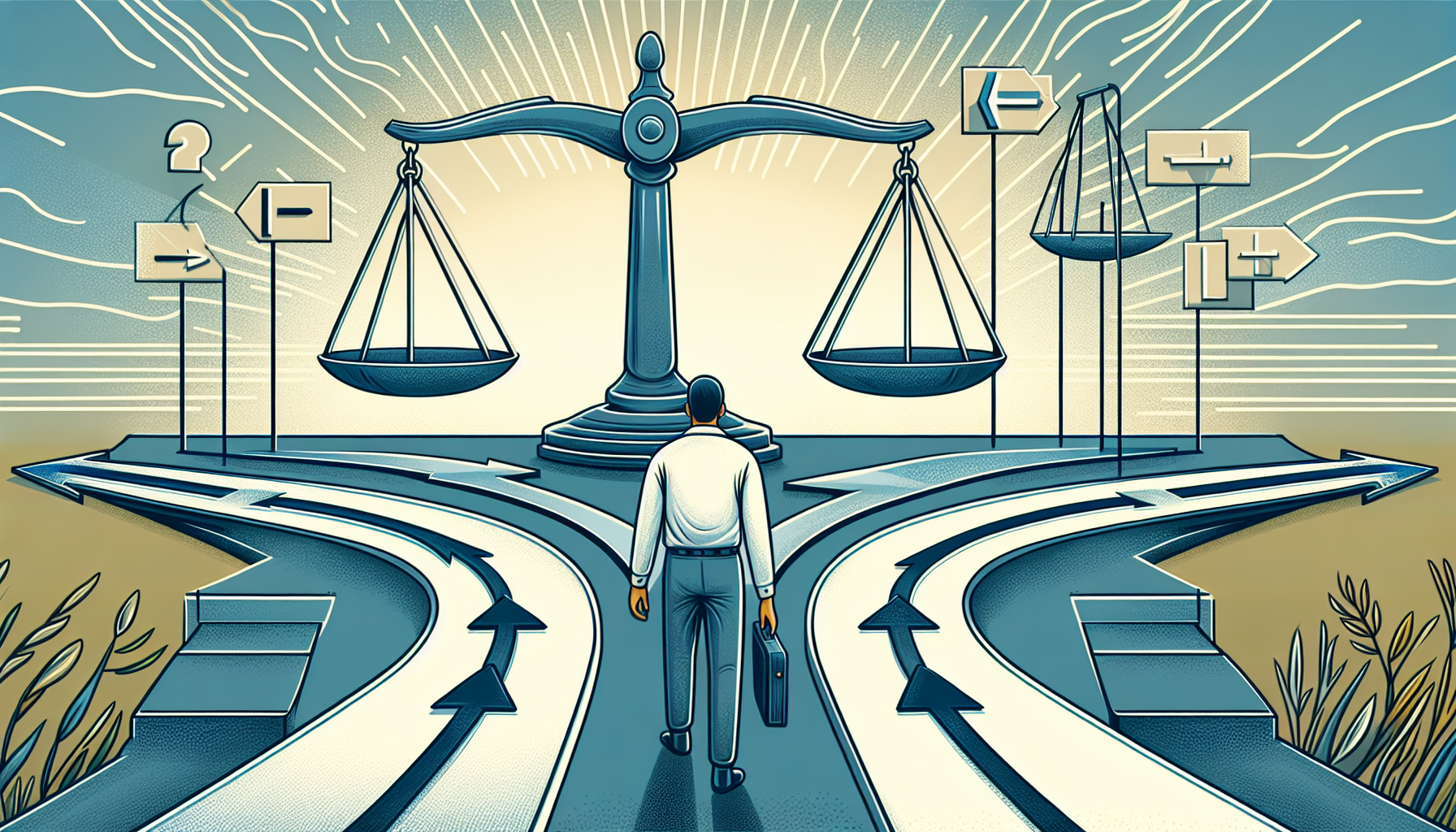Understanding Choice Theory
Choice Theory is a psychological framework that emphasizes personal responsibility and the power of individual choice. It is based on the premise that individuals can only control themselves and have limited power to control others. This theory, developed by Dr. William Glasser, empowers individuals to take ownership of their choices and supports others in doing the same [1].

Core Principles
At the core of Choice Theory are several key principles that shape its framework. These principles include:
- Personal Responsibility: Choice Theory emphasizes that individuals are ultimately responsible for their own lives and the choices they make. By accepting personal responsibility, individuals can take control of their actions and decisions.
- Choice: The theory recognizes that individuals have the power to make choices about their behavior and responses to different situations. These choices can influence the outcomes and experiences individuals have in their lives.
- Control: Choice Theory emphasizes that individuals have control over their own thoughts, feelings, and actions. While they may not have control over external events or other people, they can choose how they respond to these factors.
Needs that Drive Behavior
Choice Theory posits that the behaviors we choose are driven by five genetically driven needs, which are hierarchical in nature. These needs are:
- Survival: The need for survival is the most basic and fundamental need. It includes the need for food, water, shelter, and safety.
- Love & Belonging: Once survival needs are met, individuals have a strong need for love, affection, and a sense of belonging. This includes the desire for meaningful relationships and connections with others.
- Power: The need for power refers to the desire for achievement, recognition, and a sense of competence. It involves having a sense of control and influence over one’s environment.
- Freedom: The need for freedom involves the desire for independence, autonomy, and the ability to make choices without undue constraints or restrictions.
- Fun: The need for fun encompasses the desire for enjoyment, pleasure, and engaging in activities that bring joy and satisfaction.
Understanding these needs helps individuals recognize the motivations behind their behaviors and the behaviors of others. By fulfilling these needs in healthy and constructive ways, individuals can lead more fulfilling and satisfying lives [1].
By exploring the core principles and needs that drive behavior within Choice Theory, individuals can gain a deeper understanding of their own choices and behaviors. This understanding can empower individuals to take responsibility for their own lives and make choices that align with their values and aspirations.
Evolution of Choice Theory
Choice Theory, as we know it today, has evolved over time, largely influenced by the work of Dr. William Glasser. Dr. Glasser introduced Reality Therapy in 1965, which later evolved into Choice Theory as he continued to refine and practice it. Let’s explore Dr. Glasser’s contributions and how Reality Therapy became the foundation of Choice Theory.
Dr. William Glasser’s Contributions
Dr. William Glasser made significant contributions to the development of Choice Theory. He believed that behavior is not separate from choice; individuals have the power to choose their behavior at any given moment. This concept forms the core of Choice Theory.
One of Dr. Glasser’s key insights was the understanding that we cannot control the behavior of others, but we have control over our own behavior. This emphasis on personal responsibility and choice is a fundamental aspect of Choice Theory. Dr. Glasser recognized the importance of applying these principles in various settings, including education, healthcare, and personal relationships.
In the field of education, Dr. Glasser emphasized the use of classroom meetings as a means to improve communication and problem-solving. By creating an environment that encourages open dialogue and active participation, he believed that individuals can take ownership of their choices and work towards positive change.
Reality Therapy and Choice Theory
Reality Therapy, initially introduced by Dr. Glasser in 1965, is the foundation upon which Choice Theory was built. Through Reality Therapy, individuals are encouraged to focus on the present and take responsibility for their actions. The goal is to help individuals make choices that lead to more fulfilling lives.
Reality Therapy is based on the understanding that individuals have five basic needs: survival, love and belonging, power, freedom, and fun. By addressing these needs in a positive and constructive manner, individuals can improve their overall well-being. This approach emphasizes personal growth and the development of effective coping strategies.
Over time, as Dr. Glasser continued to practice and refine his theories, Reality Therapy evolved into Choice Theory. The theory expanded beyond individual therapy to encompass broader applications in various fields, including counseling, education, and personal development.
Through his contributions, Dr. Glasser provided a framework for understanding human behavior and decision-making. The principles of Choice Theory continue to guide individuals in making empowered choices and taking responsibility for their own lives.
As we delve deeper into Choice Theory, we will explore its components, axioms, and practical applications. By understanding the evolution of Choice Theory, we can gain valuable insights into how it can be applied to enhance our lives and relationships.
Components of Choice Theory
Choice Theory proposes that all behavior is composed of different components that work together to shape our actions and decisions. Two essential components of Choice Theory are the Quality World Concept and the Total Behavior Components.
Quality World Concept
According to Choice Theory, our Quality World is a personal collection of images, ideas, and ideals that we believe will enhance the quality of our lives. It represents our individual perception of an ideal world, including people, possessions, relationships, beliefs, and more. Our Quality World images serve as role models and motivate our behavior.
It is important to note that each person’s Quality World is unique and can vary even within the same family or social group. Our perceptions of the world around us are subjective and influenced by our individual experiences and values.
Total Behavior Components
Choice Theory emphasizes that all behavior is composed of four interconnected components: acting, thinking, feeling, and physiology. These components are constantly present and interact with one another, influencing our overall behavior. Glasser refers to this as “total behavior” [3].
- Acting: The component of behavior that involves our observable actions and behaviors.
- Thinking: The cognitive component of behavior that includes our thoughts, beliefs, and mental processes.
- Feeling: The emotional component of behavior that encompasses our emotions and subjective experiences.
- Physiology: The physiological component of behavior that involves the bodily sensations and responses that accompany our actions.
Although we have more conscious control over our actions and thoughts, Glasser suggests that our feelings and physiological responses are influenced by deeper subconscious levels and are less subject to direct conscious control.
By understanding the interconnectedness of these components, we can gain insights into our behavior and make choices that align with our values and goals. Recognizing the influence of each component allows us to take responsibility for our actions and make conscious decisions to bring about positive changes in our lives.
Axioms of Choice Theory
Choice Theory is founded on the principles of understanding human behavior and decision-making. To provide a solid framework for decision-making and action, Choice Theory is supported by the 10 Axioms of Choice Theory. These axioms are self-evident truths that guide individuals in their choices and behaviors, allowing them to take control of their lives and make positive changes.
Self-Evident Truths
The 10 Axioms of Choice Theory serve as self-evident truths that provide a foundation for decision-making and behavior according to Choice Theory. These axioms are:
- The only person you can control is yourself.
- All we do is behave.
- All behavior is purposeful.
- All behavior is chosen.
- All long-term behavior is driven by the five basic needs: survival, love and belonging, power, freedom, and fun.
- We can only satisfy our needs by satisfying the pictures in our Quality World.
- All we can give another person is information.
- Every individual has a unique system of values.
- All conflict is the result of competing pictures in the Quality World.
- The most important need is love and belonging.
These self-evident truths provide individuals with a framework for understanding their own behavior and the behavior of others. By recognizing and accepting these axioms, individuals can gain insight into their choices, motivations, and the underlying needs that drive their behavior.
Decision-Making Framework
The 10 Axioms of Choice Theory not only provide a set of self-evident truths but also serve as a decision-making framework. By understanding and applying these axioms, individuals can make conscious choices that align with their values and needs.
This decision-making framework emphasizes personal responsibility and empowerment. It encourages individuals to take ownership of their choices and actions, recognizing that they have control over themselves and their responses to the external world. Instead of blaming external factors or circumstances, individuals are encouraged to focus on their own behavior and make choices that lead to personal growth and fulfillment.
By embracing the 10 Axioms of Choice Theory, individuals can gain a deeper understanding of themselves, their needs, and their relationships with others. This framework provides a roadmap for making choices that are in line with personal values and that promote positive change and well-being.
Application of Choice Theory
Choice Theory empowers individuals to take responsibility for their choices and supports others in taking ownership of their choices, leading to a reduction in negative behaviors, strengthened relationships, and increased satisfaction in life. By understanding the principles of Choice Theory, individuals can gain insight into their own behaviors and make more conscious decisions. This can lead to improved relationships, enhanced problem-solving skills, and a greater sense of personal empowerment and responsibility [4].
Empowerment and Responsibility
One of the key applications of Choice Theory is the promotion of empowerment and responsibility. Choice Theory encourages individuals to assess the information provided to them and determine what aspects are within their control and what are not. By focusing on what actions and responses are within their control, individuals can make more intentional decisions and responses to situations. This shift in mindset empowers individuals to take ownership of their choices and take proactive steps towards achieving their desired outcomes.
When individuals recognize that they have the power to make choices that align with their values and goals, they are more likely to feel a sense of control over their lives. This sense of empowerment can lead to increased motivation, self-confidence, and overall life satisfaction. By embracing responsibility for their choices, individuals can also better navigate challenges and setbacks, as they understand that their responses and actions are within their control.
Strengthening Relationships
Another significant application of Choice Theory lies in the realm of relationships. By adopting Choice Theory principles, individuals can enhance their interactions with others and foster healthier connections. Choice Theory emphasizes the understanding that individuals have the power to choose their responses and behaviors in relationships.
When individuals take responsibility for their own choices and actions, they become more accountable for their role in relationships. This accountability promotes mutual respect, trust, and effective communication. By focusing on their own choices and behaviors, individuals can contribute positively to their relationships and create a supportive and nurturing environment.
Furthermore, Choice Theory encourages individuals to understand and respect the choices of others. This understanding helps to foster empathy, reduce conflicts, and build stronger connections. By recognizing that individuals have different needs and perspectives, individuals can approach relationships with greater understanding and acceptance.
In summary, the application of Choice Theory provides individuals with the tools to empower themselves, take responsibility for their choices, and strengthen their relationships. By embracing the principles of Choice Theory, individuals can navigate life with a greater sense of control, purpose, and fulfillment.
Critiques and Perspectives
Choice theory has been subject to various critiques and has also influenced other theories and perspectives in social sciences. Two notable critiques and perspectives are rational choice theory and the influence of behavioral economics.
Rational Choice Theory
Rational choice theory, established by philosopher Adam Smith and further developed by sociologists George C. Homans, Peter Blau, and James Coleman, suggests that individuals make decisions based on self-interest and the desire to derive the greatest benefit [6]. This theory posits that people assess their options and choose what they believe will serve them best.
One key assumption of rational choice theory is that individuals are in control of their decisions and make choices based on rational considerations, rather than unconscious drives, tradition, or environmental influences. Social workers find this theory helpful in understanding the motivations behind their clients’ behaviors, enabling them to design interventions and treatments that effectively address their needs.
However, rational choice theory has also faced criticism. Critics argue that it fails to account for non-self-serving behaviors, such as philanthropy or helping others without expecting personal rewards. Additionally, it overlooks the impact of social norms, ethics, values, and situational factors on decision-making. While rational choice theory provides valuable insights, it may not fully capture the complexity of human decision-making.
Behavioral Economics Influence
Behavioral economics is a more recent intervention in economic decision-making processes that seeks to explain why individuals sometimes make irrational decisions and how their behavior may not always align with the predictions of economic models. Critics of rational choice theory argue that people are often influenced by emotions and external factors, leading to decisions that are not always utility-maximizing.
Behavioral economics incorporates psychological and social factors into economic decision-making models, acknowledging that individuals may not always act in perfectly rational ways. It recognizes the impact of cognitive biases, social influence, and emotional factors on decision-making processes. By studying and understanding these influences, behavioral economics provides a more comprehensive perspective on human decision-making.
The influence of behavioral economics challenges the strict assumptions of rational choice theory, shedding light on the limitations of rational decision-making models. It emphasizes the importance of considering the complexities of human behavior when analyzing choices and decision-making processes.
By exploring rational choice theory and the influence of behavioral economics, we gain a broader understanding of the critiques and alternative perspectives that have emerged in the study of decision-making. These critiques and perspectives contribute to a more nuanced and comprehensive understanding of human choice and behavior.
References
- https://wglasser.com/what-is-choice-theory/
- https://en.wikipedia.org/wiki/Glasser%27schoicetheory
- https://lo.unisa.edu.au/mod/book/tool/print/index.php?id=454028
- https://www.abtaba.com/blog/what-is-choice-theory/
- https://mentalandsexualhealth.com/blog/choice-theory
- https://www.onlinemswprograms.com/social-work/theories/rational-choice-theory/
- https://www.investopedia.com/terms/r/rational-choice-theory.asp

 We've just released an article!
Check out our blog!
We've just released an article!
Check out our blog!



